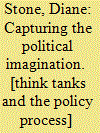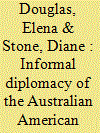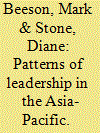| Srl | Item |
| 1 |
ID:
000798


|
|
|
|
|
| Publication |
London, Frank Cass, 1996.
|
| Description |
x, 331p.
|
| Standard Number |
0714642630
|
|
|
|
|
|
|
|
|
|
|
|
Copies: C:1/I:0,R:0,Q:0
Circulation
| Accession# | Call# | Current Location | Status | Policy | Location |
| 041850 | 320.60941/STO 041850 | Main | On Shelf | General | |
|
|
|
|
| 2 |
ID:
138158


|
|
|
|
|
| Summary/Abstract |
After 20 years, the Australian American Leadership Dialogue has acquired enviable access to political leaders in the foreign policy establishments of both countries. The influence of the Dialogue is at earlier consensus-building stages of decision making. Its importance has been in ‘relationship maintenance’ of the bilateral alliance which it has pursued through processes of informal diplomacy. The Dialogue now faces its own challenges of organisational renewal and relevance in the wider ‘interpretative community’ of Australian think tanks, university policy institutes and opinion-formers.
|
|
|
|
|
|
|
|
|
|
|
|
|
|
|
|
| 3 |
ID:
132399


|
|
|
|
|
| Publication |
2014.
|
| Summary/Abstract |
Leadership at the regional level has come under the spotlight not only in the post-Cold War context, but also more recently following the global financial crisis. Yet, leadership by states within region-building and regional associations as leaders vis-à-vis other regions or powers remains relatively new territory for analysis and consideration, even though the Association of Southeast Asian Nations (ASEAN) has attracted both admirers and sceptics. This introductory essay is intended to achieve two principal objectives regarding this symposium addressing Asia-Pacific regional leadership. First, we seek to put the 'Asia-Pacific' in historical context and identify some of the forces that have not only shaped but also hindered its realization. Recognizing China's historical role and contemporary rise is important to understand the parameters within which ASEAN and its member states seek to define particular visions of regional identity and enact collective enterprises. The other key background consideration when thinking about contemporary leadership in the Asia-Pacific is that the United States is seemingly in decline. The Asia-Pacific's two most consequential powers - the United States and China - are pervasive considerations for any regional organization that aims to lead and promote cooperation to solve collective action problems.
|
|
|
|
|
|
|
|
|
|
|
|
|
|
|
|